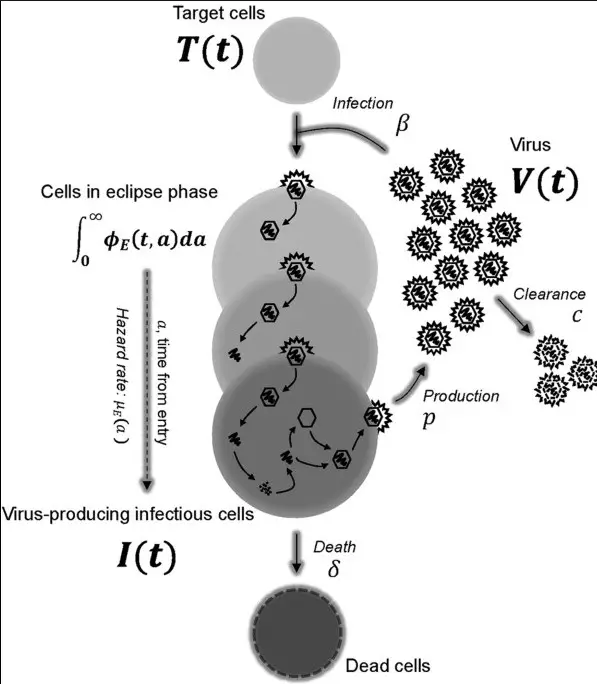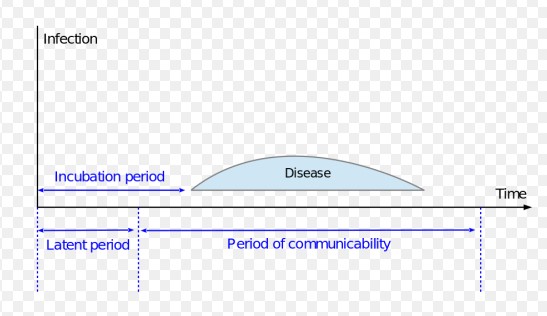In the complex world of virology, the mechanisms through which viruses replicate and spread are central to our understanding of infectious diseases. Two pivotal phases in the viral life cycle, the eclipse and latent periods, play crucial roles in this process. While they may sound similar to the uninitiated, each period has distinct characteristics and implications for the spread and control of viruses.
The eclipse period is a phase in the viral replication cycle when the virus is inside a host cell but not yet detectable as infectious particles. In contrast, the latent period refers to the time from when a virus infects a host until the host becomes infectious to others. Essentially, the eclipse period is part of the latent period, but the latter encompasses additional stages, including the time it takes for newly formed viruses to exit the host cell and become capable of infecting new cells.
This distinction is more than semantic; it is crucial for developing vaccines, understanding virus transmission, and controlling outbreaks. By examining these periods closely, researchers can gain insights into the behavior of viruses at a cellular level and the broader dynamics of their spread through populations.

Basics of Viral Replication
Definition and Significance
Viral replication is the process viruses use to duplicate themselves. Unlike living cells, viruses cannot reproduce on their own; they must invade a host cell to produce new virus particles. This process is vital for the survival and spread of viruses and understanding it is crucial for developing vaccines and antiviral drugs.
Steps in the Viral Life Cycle
- Attachment: The virus binds to the surface of the host cell.
- Penetration: The virus or its genetic material enters the host cell.
- Synthesis: The host cell produces viral components (proteins and nucleic acids).
- Assembly: New virus particles are assembled from the synthesized components.
- Release: Newly formed viruses exit the host cell, often killing it in the process.
What is the Eclipse Period?
Definition and Characteristics
The eclipse period is the early phase of viral replication during which viruses are not detectable outside the host cell. This period begins when a virus penetrates a host cell and ends when new virus particles are first formed and capable of being detected as infectious.
Role in Viral Replication
During the eclipse period, the virus takes control of the host cell’s machinery to replicate its genetic material and produce viral proteins. This period is crucial for the virus to multiply undetected by the host’s immune system.
Factors Influencing the Eclipse Period
- Virus type: Different viruses have varying lengths of eclipse periods.
- Host cell: The type of cell infected can affect the duration and efficiency of viral replication.
- Environmental conditions: Temperature and pH can influence the speed of viral replication.
What is the Latent Period?
Definition and Features
The latent period is the time from when a virus infects a host until the host becomes infectious. It includes the eclipse period and the time required for new viruses to mature, exit the host cell, and be capable of infecting new cells.
Distinguishing Factors from the Eclipse Period
The latent period is broader, covering the entire process from infection to the point where the host can transmit the virus. The eclipse period is just one part of the latent period, focused on invisible viral replication inside the host cell.
Importance in Virology and Epidemiology
Understanding the latent period is essential for predicting the spread of viruses and managing outbreaks. It helps in determining the appropriate quarantine measures and understanding the dynamics of virus transmission.
Eclipse vs. Latent Period
Key Differences
- Scope: The eclipse period is a phase of non-detectability of the virus within a host cell, whereas the latent period spans from infection to infectiousness of the host.
- Duration: The eclipse period is generally shorter than the latent period.
Comparative Analysis on Duration and Phases Involved
- The eclipse period is tightly focused on viral replication and assembly within the cell.
- The latent period encompasses not only replication and assembly but also the maturation and release of viruses, making it longer.
Impact on Virus Transmission and Host Response
- Eclipse period: During this time, the virus is virtually invisible to the host’s immune system, allowing it to replicate without interference.
- Latent period: This period affects how quickly a virus can spread in a population, as it includes the time taken for a host to become infectious.

Factors Affecting Eclipse and Latent Periods
Viral Factors
- Type and Genetics: Different types of viruses exhibit distinct eclipse and latent periods. The genetic makeup of a virus determines how quickly it can replicate and how it interacts with the host’s cellular machinery. RNA viruses tend to replicate faster than DNA viruses, influencing the duration of these periods.
- Mutation Rates: High mutation rates can alter the characteristics of viral replication, potentially shortening or lengthening the eclipse and latent periods. Mutations can lead to the emergence of more virulent strains with altered replication cycles.
Host Factors
- Immune Response: The efficiency of the host’s immune system plays a crucial role. A robust immune response can extend the latent period by preventing the virus from spreading quickly.
- Cell Type: Different cell types can support viral replication to varying degrees. For instance, some viruses specifically target epithelial cells, while others may infect immune cells, affecting the duration of eclipse and latent periods.
Environmental Factors
- Temperature: The ambient temperature can significantly affect viral replication rates. Some viruses replicate more efficiently at higher temperatures, potentially shortening these periods.
- Presence of Inhibitors: Antiviral drugs or naturally occurring inhibitors can delay viral replication, extending the eclipse and latent periods.
Measuring Eclipse and Latent Periods
Techniques and Methodologies
- Viral Titration: This involves measuring the concentration of viruses at various time points post-infection to determine when viruses become detectable.
- Molecular Techniques: PCR and other molecular tools can detect viral genetic material even when virus particles are not yet present, offering insights into the eclipse period.
Challenges and Considerations
- Sensitivity of Detection Methods: The ability to detect low levels of viral particles or genetic material can significantly influence measurements of the eclipse and latent periods.
- Variability Among Hosts: Differences in immune response and cellular environments across individuals can lead to variability in these periods, complicating their measurement.
Implications in Virology
Eclipse Period in Vaccine Development
- Understanding the eclipse period is critical for developing effective vaccines. By targeting the early stages of viral replication, vaccines can potentially prevent the virus from reaching detectable levels, stopping the infection before it starts.
Latent Period in Disease Control and Prevention
- Knowledge of the latent period helps in designing quarantine and isolation protocols. It informs public health officials of the window during which an infected individual may not show symptoms but can still transmit the virus.
Implications in Epidemiology
Predicting Virus Spread
- Accurate models of virus spread require detailed understanding of the eclipse and latent periods. These models can predict the speed and scope of outbreaks, guiding public health interventions.
Modeling Epidemic and Pandemic Outbreaks
- Epidemiological models use data on the eclipse and latent periods to simulate the dynamics of virus transmission. This helps in forecasting the potential impact of outbreaks and evaluating the effectiveness of control measures.
Real-world Examples
Case Studies Highlighting the Differences
- Influenza vs. HIV: Influenza viruses have a short eclipse period, leading to rapid onset of symptoms. HIV, in contrast, has a lengthy latent period, during which infected individuals can unknowingly transmit the virus.
- COVID-19: The SARS-CoV-2 virus demonstrated how differences in the latent period among individuals can affect the spread of the virus and challenge public health responses.
Lessons Learned from Historical Virus Outbreaks
- 1918 Influenza Pandemic: The devastating impact of the 1918 flu highlighted the importance of understanding viral replication cycles for controlling outbreaks.
- HIV/AIDS Epidemic: The long latent period of HIV infection underscored the need for early detection and treatment strategies to prevent virus transmission.
Frequently Asked Questions
What is the Eclipse Period in Virology?
The eclipse period in virology is the initial phase after a virus enters a host cell, during which it cannot be detected outside the cell because it is within the process of replication. This period is critical for understanding how viruses multiply and the early stages of infection before viruses become detectable as infectious particles.
How Does the Latent Period Differ from the Eclipse Period?
While the eclipse period is focused on the invisible phase of viral replication within a host cell, the latent period encompasses a broader timeline, from initial infection to the point where the host starts shedding the virus and becomes infectious. The latent period includes the eclipse period as well as the time it takes for the virus to mature and exit the host cell.
Why are Eclipse and Latent Periods Important in Epidemiology?
Understanding the eclipse and latent periods is vital for epidemiology because it helps predict how rapidly a virus can spread within a population. These periods indicate the window of time during which an infected individual may not show symptoms or spread the virus, crucial for developing effective quarantine measures and forecasting the spread of infections.
Conclusion
The concepts of eclipse and latent periods are foundational in the study of virology and epidemiology, offering essential insights into how viruses replicate and spread. By distinguishing between these two phases, researchers can better understand the dynamics of viral infections and develop strategies for prevention and control. This understanding is critical not only for the scientific community but also for public health responses to infectious disease outbreaks.
The implications of these periods extend beyond academic interest, impacting vaccine development, public health policies, and global strategies to combat infectious diseases. As we continue to face new viral threats, the knowledge of eclipse and latent periods will remain a cornerstone in the ongoing effort to protect human health against viruses.

